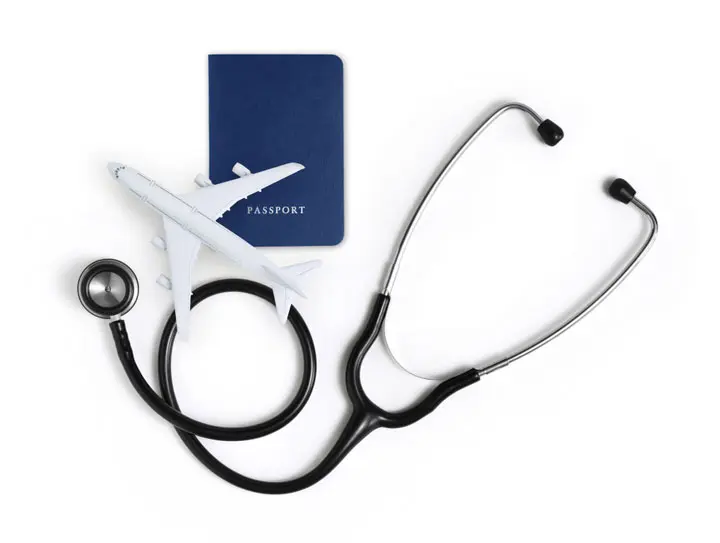Travel nursing is a growing field that offers healthcare professionals the opportunity to explore new places, gain valuable experience, and earn a competitive salary. If you are a nurse who loves adventure and wants to make a difference in the lives of patients across the country, then becoming a travel nurse might be the perfect career choice for you. In this article, we will provide a step-by-step guide on how to become a travel nurse, including the requirements, qualifications, and tips to help you succeed in this exciting field. So, let’s get started!

Is a Career as a travel nurse right for me?
Becoming a travel nurse can be a fulfilling and exciting career choice. Travel nurses work for independent staffing companies that recruit registered nurses (RNs) to fill positions across the United States and even abroad. With an ongoing shortage of nurses, hospitals and clinics often struggle to maintain their staffing needs, which is where a travel nurse can help. Not only do they provide support for understaffed hospitals, but they can also fill in temporary gaps when regular nurses take time off for vacation, leave, or are hired by a different facility.
As a travel nurse, you will sign a contract to fill a temporary position that can last for several days, weeks, months, or even longer. Your placement can vary from a local understaffed hospital to an international healthcare facility. Once your contract is up, you have the option to extend your stay at the same location or move on to a new destination and opportunity. While most placements are between 8 to 26 weeks, the length of contracts can vary based on the needs of the facility.
One of the benefits of becoming a travel nurse is the opportunity to experience new adventures, meet new people, and visit new areas. As you move from one location to another, you get to develop an understanding of healthcare in various communities and broaden your nursing skills. It’s not uncommon for travel nurses to fall in love with a temporary assignment and have it turn into a full-time position.
If you’re passionate about nursing and have a desire to try new experiences while making a difference in the lives of patients, then the perfect career move for you might be to become a travel nurse.
How to become a Travel Nurse
Step 1: Get Your Nursing Degree
The first step on how to become a travel nurse is to earn your nursing degree. You can choose to pursue an Associate Degree in Nursing (ADN) or a Bachelor of Science in Nursing (BSN) from an accredited nursing program. Most nursing programs take 2-4 years to complete, depending on your level of education and the program’s requirements. Once you have completed your nursing degree, you will need to pass the National Council Licensure Examination (NCLEX) to obtain your nursing license.
Completing a nursing degree usually takes more time than a typical degree, so finishing one indicates a person’s commitment to their profession. Employers appreciate this level of dedication because it suggests that the individual is more likely to remain in the field for an extended period. While degrees in related fields such as social work and psychology may provide entry into nursing, they may restrict the individual’s nursing work and decrease their chances of becoming a travel nurse.
Step 2: Gain Nursing Experience
If you aspire to become a travel nurse, you will need to have at least one year of nursing experience in your specialty area. This prerequisite is necessary because travel nursing involves a significant degree and a high level of clinical competence and autonomy or independence.
As a travel nurse, you may be required to work in different healthcare settings, which could pose unique challenges. Having prior nursing experience prepares you for such challenges by developing your skills and knowledge in diverse clinical environments.
Moreover, pursuing certification in your specialty area is an excellent way to enhance your qualifications and stand out among other candidates. Certifications demonstrate your expertise in a particular field and your commitment to ongoing professional development. You can obtain certifications through professional nursing organizations or specialty certification boards, depending on your area of interest.
In summary, becoming a travel nurse requires a strong foundation in nursing with a minimum of one year of experience in your specialty area. Obtaining additional certifications in your field can further enhance your qualifications and increase your chances of securing travel nursing opportunities.
Step 3: Research Travel Nursing Agencies
After acquiring the essential nursing experience, the next step for you to become a travel nurse is to begin your search for travel nursing agencies. These agencies specialize in providing travel nurses with employment opportunities, housing arrangements, and various other benefits. However, it is crucial to select a reputable agency with a proven track record of placing travel nurses in desirable locations and providing excellent support.
To begin your search for a travel nursing agency, you can conduct thorough research and consider various factors such as agency reputation, job availability, compensation packages, benefits, and support services. One of the best ways to gauge an agency’s reputation is to read online reviews and testimonials from current and former travel nurses who have worked with them.
Some of the top travel nursing agencies in the United States include American Mobile, Aya Healthcare, and Cross Country Nurses. These agencies have established themselves as industry leaders, providing exceptional travel nursing experiences for their nurses. They offer a wide range of nursing specialties, job opportunities in desirable locations, competitive compensation packages, housing accommodations, and excellent support services such as 24/7 clinical support, health benefits, and travel reimbursement.
Step 4: Submit Your Application
After you have chosen a travel nursing agency, another step to take to become a travel nurse is to submit your application. This typically includes your resume, nursing license, certifications, and references. You will also need to fill out paperwork and undergo a background check. Once your application is approved, you can start looking for travel nursing assignments that match your skills, preferences, and availability.
Step 5: Choose Your Travel Nursing Assignment
One of the most exciting aspects of travel nursing and becoming a travel nurse is the opportunity to choose your assignments. You can choose to work in a variety of healthcare settings, such as hospitals, clinics, and long-term care facilities. You can also choose to work in different parts of the country, from rural areas to bustling cities.
When choosing your travel nursing assignment, it is essential to consider various factors that can influence your overall experience. One of the crucial factors to consider is the job requirements, including the facility’s specialty and patient population. You should also assess the facility’s work environment, such as the staffing ratios and support systems, to ensure that it aligns with your working style.
Another critical factor to consider is the location of your travel nursing assignment. You can choose to work in various regions and climates, depending on your preferences. For example, you may prefer to work in sunny and warm areas or in cooler climates. You should also consider the distance from your family and loved ones, as well as accessibility to essential services and amenities.
Furthermore, it is important to evaluate the housing and compensation package offered by the travel nursing agency. You can choose between provided housing or opting for a housing stipend to find your own accommodation. Additionally, you should consider the overall compensation package, including the hourly rate, overtime, and benefits.
Step 6: Prepare for Your Assignment
Before you start your travel nursing assignment, you will need to prepare for your new role. This includes obtaining any necessary licenses or certifications for the state where you will be working, packing your belongings, and arranging for housing. You should also research the local area and familiarize yourself with the healthcare facility where you will be working. This will help you feel more confident and prepared when you start your new job.
Step 7: Excel as a Travel Nurse
Once you commence your travel nursing assignment, it is crucial to perform excellently in your role. This involves delivering top-notch patient care, communicating effectively with your coworkers, and adjusting to unfamiliar work environments. Additionally, it would be beneficial to take advantage of the opportunities available for professional growth and networking that come with travel nursing. Excelling as a travel nurse can help you establish a solid professional reputation and boost your career opportunities.
Tips for Success as a Travel Nurse
In addition to the steps outlined above, there are several tips that can help you succeed as a travel nurse:
- Be flexible: Travel nursing requires a high level of flexibility and adaptability. You may need to work different shifts, adjust to new healthcare settings, and deal with unexpected challenges. By being flexible, you can thrive in this dynamic field.
- Communicate effectively: Effective communication is essential for travel nursing. You will need to communicate with patients, colleagues, and healthcare providers from diverse backgrounds. By honing your communication skills, you can build trust and rapport with others.
- Stay organized: Travel nursing can be fast-paced and demanding. By staying organized, you can manage your time effectively, prioritize your tasks, and avoid burnout.
- Maintain a positive attitude: Travel nursing can be stressful at times, but maintaining a positive attitude can help you stay motivated and focused. By focusing on the positive aspects of your job, you can enjoy your travel nursing experience to the fullest.
Conclusion
Becoming a travel nurse can be a rewarding and exciting career choice for healthcare professionals who love adventure and want to make a difference in the lives of patients across the country. By following the steps outlined in this article, you can become a travel nurse and enjoy the benefits of this dynamic field. Remember to stay flexible, communicate effectively, stay organized, and maintain a positive attitude to succeed as a travel nurse. Good luck on your journey!






